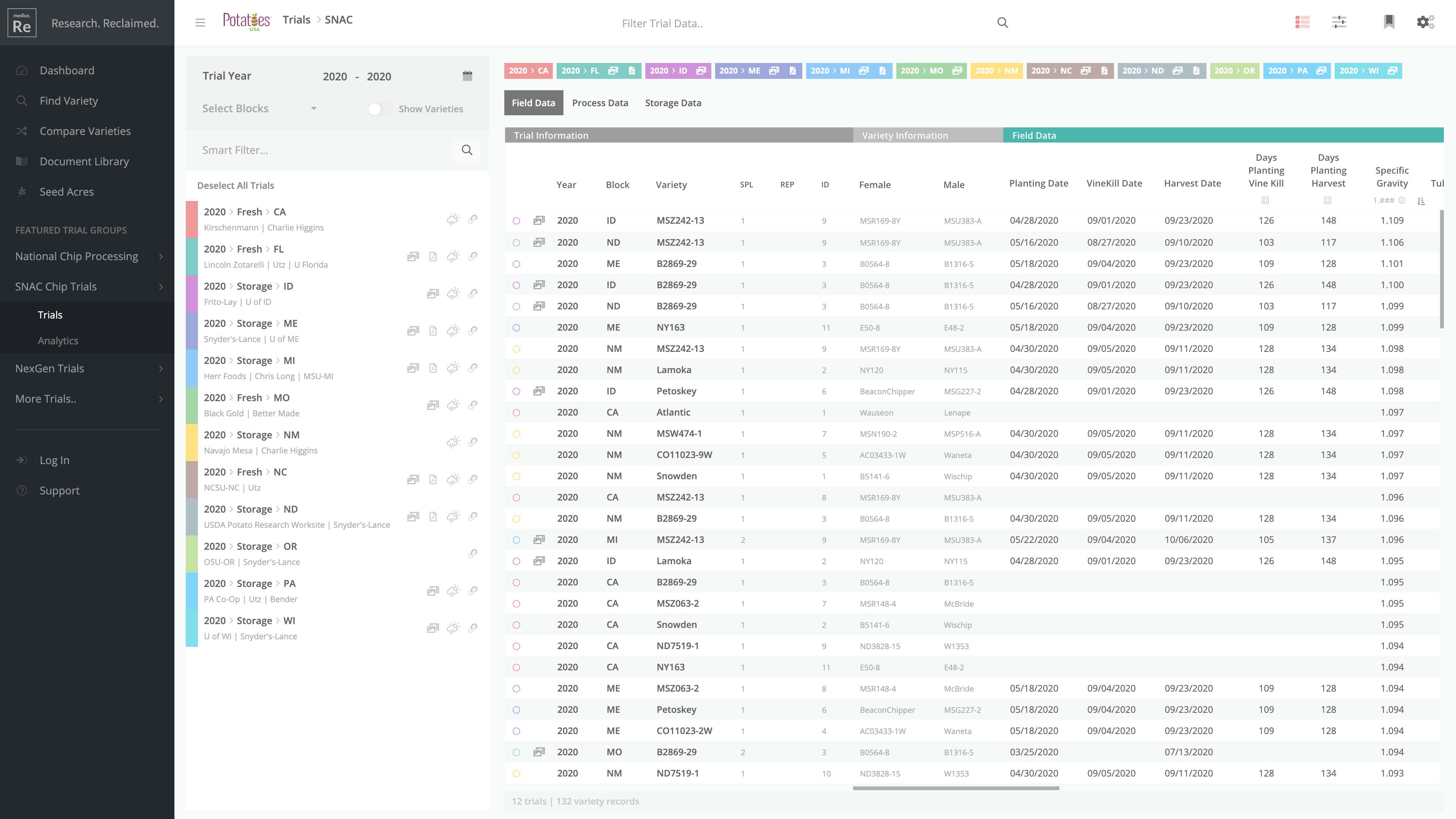On Jan. 6, Medius Ag founder and president Brad Halladay hosted a panel discussion during a breakout session at the annual Potato Expo. Originally slated for Grapevine, Texas, the Expo was held virtually for the first time due to public health considerations related to the ongoing pandemic. The breakout session, “Online Variety Selection Resources for the Potato Industry,” focused primarily on the industry’s capacity to analyze data from emerging potato varieties through Medius.Re, a collaborative, online data management platform first adopted by Potatoes USA in 2016.
The panel represented a cross-section of the industry including farming operations, research and extension programs, and grower associations. In addition to Halladay, panelists were Scott Pensky, an agronomist for CSS Farms in Dalhart, Texas; Chris Long, program lead at Michigan State University’s Potato Outreach Program and Potatoes USA contractor; and Chris Voigt, executive director of the Washington State Potato Commission. The discussion provided members of the virtual audience with several different perspectives on the value of Medius.Re to potato variety development and selection.
To kick off the breakout session, Halladay spoke about the meaning of the word “Medius,” which in Latin means middle.
“It is our goal to develop solutions that bring people and data together,” he said. “We want to create opportunities for collaboration within the industry.”
Halladay noted that when he first started in the potato industry on the supply chain side of the business, it soon became clear to him that better data solutions were needed—particularly in the area of variety development, where bringing a new clone to market can take as long as 15 years and cost hundreds of thousands of dollars. That was the inspiration for what is now known as Medius.Re.
In his work at CSS Farms, Pensky highlighted the value of the analytics tool within Medius.Re, specifically for solids, yield, fry quality out of the field, and periodic storage samples throughout the year.
“When you get the email asking, ‘Hey, what varieties perform best?’, you send them a screenshot,” he said. “It’s generated super easy.”
Pensky added that in some cases, small plot yields are greeted with a level of skepticism, so it is helpful to customize the value of a particular attribute.

Data from Medius.Re about different varieties in the NFPT has allowed users to stay up to date on emerging varieties’ performances.
Convenience was a theme for Long as well. “In those ‘meeting months’ of November to March, I really spend a large part of my time preparing for and giving presentations to deliver that information out to the industry,” Long said. “I really spend a significant amount of time actually trying to assimilate information into an applied or tangible way that’s formatted for a simple update.”
He added that while he still spends as much time looking at data during meeting months now as compared to five to 10 years ago, he’s able to do so much more efficiently. Long also praised the data standardization and consistency across the country in both criteria and metrics that enable the industry to address bigger questions.
Voigt, the final panelist, leaned on his 25 years of experience in the potato industry to provide additional perspective on where technology in the industry had been and where it was headed. When talking about the National Fry Processors Trial (NFPT) program that seeks to develop and identify a processing potato that improves on the Russet Burbank, Voigt said, “You talk to growers and they’ll say, ‘Yeah I grow it [Russet Burbank] but I don’t like it.’ There’s gotta be a better potato out there.”
Voigt noted that the Medius.Re platform gives the potato industry the tool it needs to make decisions earlier in the process. “There’s no sense in continuing to invest in a variety if it’s a dog,” said Voigt, adding that NFPT participants now know if a new variety is not going to work in one to three years.
Besides convenience, standardization and efficiency, Medius.Re is perfectly suited for collaborating over distance. In a year when in-person meetings have all but vanished, Medius.Re enabled its users to stay up to date on new varieties. In some cases, entire events and even a year’s worth of trial data were salvaged by moving exclusively to Medius.Re’s online platform. The annual NFPT field day conducted in East Grand Forks, Minn., is the clearest example of that. With state and federal authorities discouraging or even banning travel, program participants were still able to evaluate the varieties in the program.
“We had the [data] management system in place to pull that off,” said Voigt. “We were still able to do our work and do it well.”
To conclude the session, Halladay provided a few examples of how interested parties can use the Medius.Re platform, including the analytics and comparison tools. More potato-specific data can be found at potatoesusa.medius.re.
“My professional philosophy can be boiled down to this: See a problem, solve a problem,” says Halladay. “But I don’t want it to stop there. I want to solve that problem with the intensity and respect it deserves, to exceed expectations in delivery and creativity. I think that mindset resonates strongly with the agricultural industry. We are all searching for ways to improve our accuracy and efficiency. Medius.Re brings all the data together into an easily understood platform that greatly boosts efficiency in time and money. Who doesn’t want that?”
Besides potatoes, the Medius.Re platform is now being used for wheat, corn and soybeans. For more information on the online platform, visit medius.re.